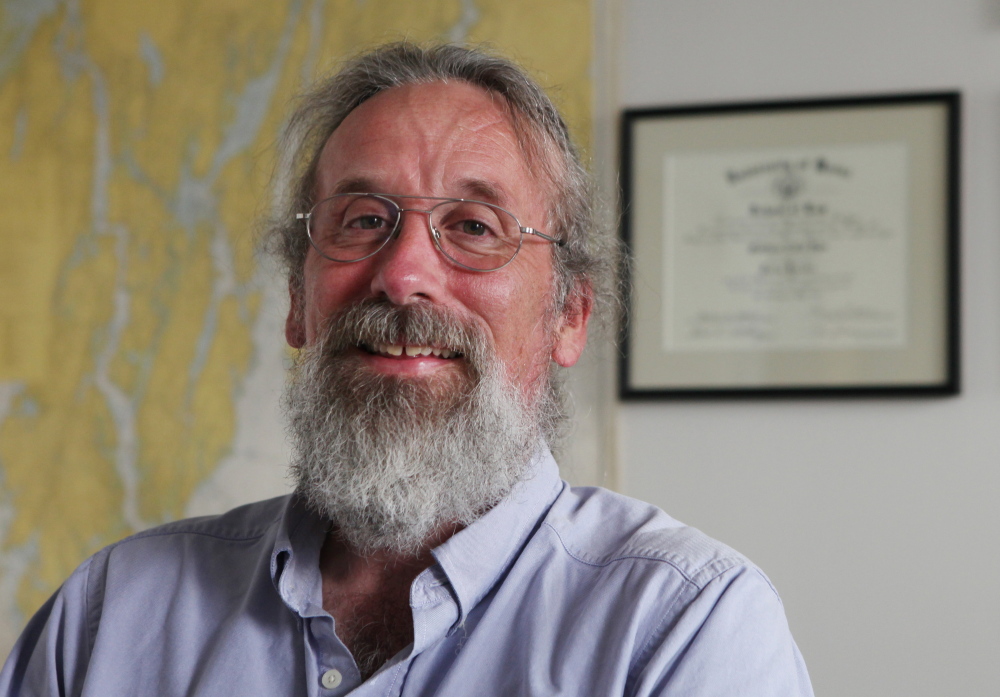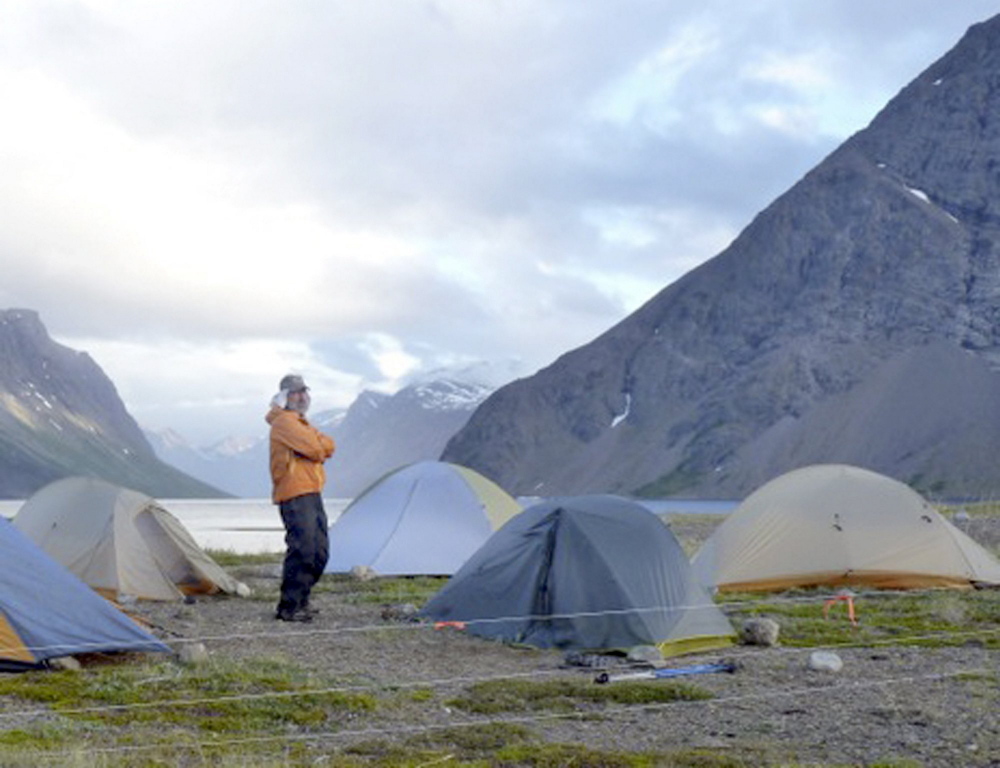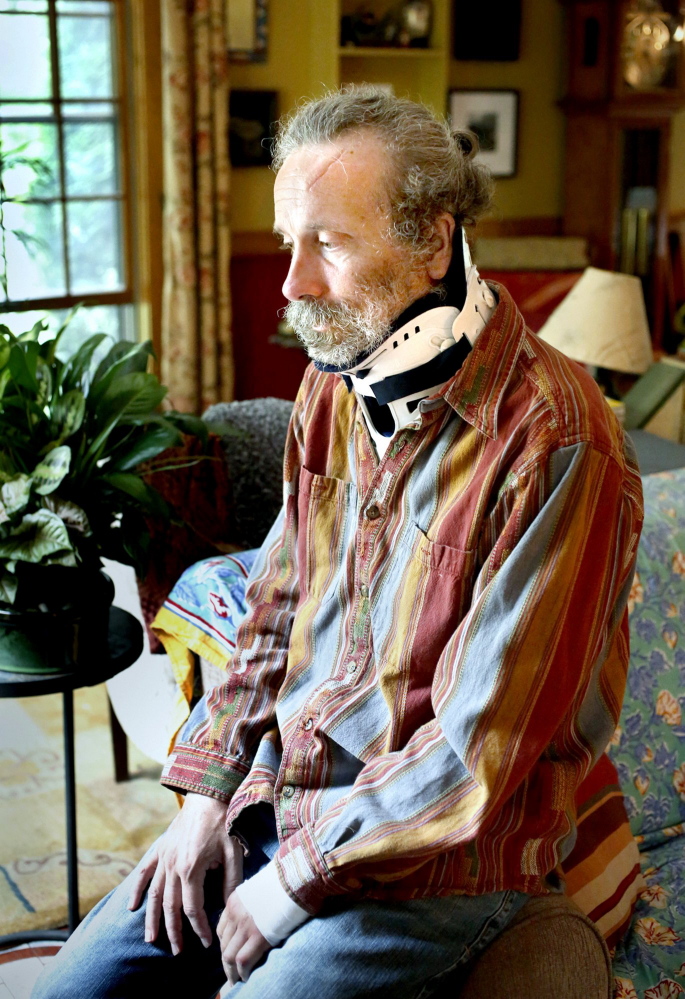Matt Dyer looks from side to side, aware of the scar tissue inside his neck but feeling no pain from it. He flexes his fingers, which have recovered to wield a chainsaw and put up six cord of wood this spring, most of it he split by hand.
His gray hair has grown back so that he can again bind it into a ponytail.
It is his voice that recalls the near-fatal attack by a polar bear one year ago — a voice made raspy when some of his vocal cords were paralyzed by the crushing pressure of the bear’s jaw, which lifted him by the head, fractured two vertebrae and broke his jaw.
“I got no complaints,” said Dyer, 49, a civil rights lawyer with Pine Tree Legal Assistance in Lewiston. “Every day is a good day to be alive.”
Dyer was on a Sierra Club excursion to Torngat Mountains National Park in Canada’s Labrador province when a bear broke through an electrified fence intended to protect their campsite.
Dyer, lying awake in his tent, saw the shadow of the bears’ front paws just before he felt its jaws biting down on his head. The bear plucked him through the fabric of the tent then started to carry his limp body away from the camp. One of his hiking party fired a flare, which apparently distracted the bear enough so he dropped his prey and ambled off.
One of the party was a doctor, who tended to Dyer while they waited seven hours for a helicopter to fly him out.
Five weeks after the attack, Dyer was able to describe the experience, saying at the time: “He had me by the back of the neck … I didn’t scream. I wasn’t panicking. I was just keeping still, waiting for it to happen.”
Dyer said during an interview Friday that he has never had nightmares about the experience. He reasons that it’s because he didn’t have time to feel the terror of being pursued by a giant carnivore. He woke, and he was helpless.
“This was more like getting hit by a truck, but a little different,” he said. He tries not to think about the ordeal, though once in a while he considers what could have happened if the bear’s teeth grabbed at a slightly different angle, leaving him blind or worse.
He thinks his teammates on the hike had it worse emotionally. They had to see his mauled body and were convinced he was dead, not to mention standing vigil for hours waiting for help, the polar bear unseen somewhere in the surrounding hills.
Several in the group, Dyer included, are re-uniting next week for a hiking excursion to — of all places — the Bear Lakes Basin in the John Muir Wilderness in California.
“Apparently there are no grizzlies there. A few black bears, but we have those here,” he said. The club has waived the trip fee for Dyer, but he doesn’t know about the four others from the previous trip that will be joining him.
The Torngat Mountain National Park trip is no longer listed on the trips offered by the Sierra Club. Dyer said he understood that the two trip leaders that guided excursions into the polar bear country of northeastern Canada no longer do it.
Dyer’s wife, photographer Jeanne Wells, on Friday said the past year was a good year for healing.
“I lost a tremendous amount of weight and wasted (away) from the injury,” Dyer said. He was surviving on a liquid diet at one point, but even water burned going down. He returned to work part time at the end of September, two months after the attack, but he was incredibly weak and often exhausted. As the autumn dragged on “I was about ready to give up,” but then benefited from a medicine that allowed him to eat without pain.
By February he was eating and starting to get his strength back.
He did physical therapy for his neck and occupational therapy for his hand.
He saw specialists in Portland and in Boston in an effort to repair his damaged vocal cords with limited success. He continues to do speech therapy for his voice.
“Harvard Pilgrim would have rooted for the polar bear once the (medical) bills started coming in,” he quipped, referring to his health insurance carrier.
Dyer started snowshoeing, trying to get back into shape. And work at Pine Tree Legal Assistance, which advocates for people who can’t afford to retain a lawyer, was demanding.
Poor tenants who had no heat and unresponsive landlords needed help. He returned to working full time.
Last month, the Maine Bar Association presented him with the John W. Ballou award, which honors Mainers who advance the ideals of the bar association. He said he was honored, but then adds as a soft aside, “I’m sure it’s because I was attacked by the bear and survived.”
Philosophically, his temperament has mellowed since the near-death experience.
“I don’t get nearly as upset as I used to about things,” he said. “You don’t sweat the petty stuff.”
He’s had lots of support from coworkers, other lawyers and people from the communities of Lewiston, where he works, and Turner where he lives.
Dyer is aware he represents a rare case.
“There’s not many of us polar bear survivor alums,” he said. “Nothing like it will ever happen to me again — I hope.”
He does plan to return to the Torngat Mountains National Park later this summer, “to the scene of the crime” this time with another group.
Dyer now believes it’s inadequate to sleep behind an electric bear fence. Having an abiding reverence for nature, Dyer hopes the park continues to restrict firearms, that they devise some other way for humans to safely experience that wild land in its pristine state without having to kill its natural inhabitants.
He said he’s happy to go again but doesn’t intend to camp on the beach this time. He plans to stay offshore on a boat.
“I’ll be the one to make sure the ladder’s up.”
David Hench — 791-6327
dhench@mainetoday.com
Twitter: @Mainehenchman
Copy the Story LinkSend questions/comments to the editors.





Success. Please wait for the page to reload. If the page does not reload within 5 seconds, please refresh the page.
Enter your email and password to access comments.
Hi, to comment on stories you must . This profile is in addition to your subscription and website login.
Already have a commenting profile? .
Invalid username/password.
Please check your email to confirm and complete your registration.
Only subscribers are eligible to post comments. Please subscribe or login first for digital access. Here’s why.
Use the form below to reset your password. When you've submitted your account email, we will send an email with a reset code.